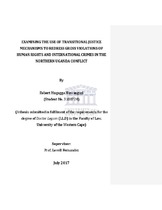Examining the use of transitional justice mechanisms to redress gross violations of human rights and international crimes in the northern Uganda conflict
Abstract
Uganda and her citizens have endured a troubled, violent, conflict-prone history since
independence from the British on 9th October 1962. Conflict in Uganda, just like in many an
African country, has its primary root causes in the colonial legacy which sowed a fertile
ground for several other secondary causes of present day subsisting conflicts. During
Uganda's various military conflicts millions have had their human rights and civil liberties
violated with impunity. At the end of each conflict and / or crisis, Uganda has had to
grapple with the challenge of finding a lasting solution amidst the significant losses made
by the country, many ethnic groups and her citizens. No long term viable and efficient
solution or mechanism has been introduced or instituted to forestall future conflicts. What
appears to have been introduced or instituted are stopgap measures.
Since President Yoweri Museveni took over power on 26 January 1986, a military conflict
has been raging in northern Uganda and the surrounding areas spanning eastern Uganda,
South Sudan, the Democratic Republic of Congo (hereafter: 'DRC'), the Sudan and the
Central African Republic (hereafter: 'CAR'). In this decades-old conflict, the war has
primarily pitted the Lord's Resistance Army (hereafter: 'LRA') against the Uganda Peoples
Defence Forces (hereafter: 'UPDF'). Like many conflicts, the more than twenty-year-old
contestation has resulted in the gross violations of human rights of millions of people
situated across five African states. The human rights violations, which have resulted in the
commission of international crimes have been perpetrated and perpetuated with impunity
by both warring parties (LRA and UPDF). Although initially an internal conflict, the conflict
in northern Uganda has catapulted itself into an international conflict based on the parties
involved, the interest generated, the crimes committed and the areas and people affected
by it.

